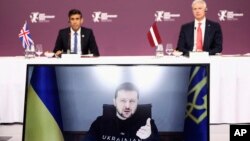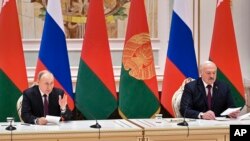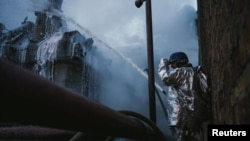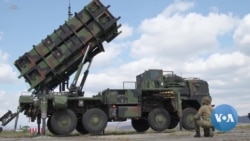At a meeting with the leaders of the Joint Expeditionary Force (JEF) in Latvia Monday, Ukrainian President Volodymyr Zelenskyy urgently requested more military and defense support.
“Russian aggression can and must fail. And our task now is to speed it up. Now — at this summit — I urge you to do everything to speed up the defeat of the occupiers,” he said.
The U.K.-led force includes Denmark, Finland, Estonia, Iceland, Latvia, Lithuania, the Netherlands, Sweden and Norway; eight of the group are also members of NATO, with Finland and Sweden currently outside that alliance.
Earlier Monday, Russian President Vladimir Putin made a rare visit to Minsk, extolling the benefits of cooperation with neighboring ally Belarus, stoking fears in Kyiv that plans for a joint ground offensive are in the works.
Ukrainian joint forces commander Serhiy Nayev said he believed Putin's meeting with his Belarusian counterpart would address "further aggression against Ukraine and the broader involvement of the Belarusian armed forces in the operation against Ukraine, in particular, in our opinion, also on the ground."
Belarusian President Alexander Lukashenko has said repeatedly he has no intention of sending his country's troops into Ukraine, after providing Russian troops with a launching pad for the invasion in February.
"Russia has no interest in absorbing anyone," Putin said during the news conference. "There is simply no expediency in this. ... It's not a takeover, it's a matter of policy alignment."
Asked about this comment, U.S. State Department spokesperson Ned Price said it should be treated as the "height of irony," given it was "coming from a leader who is seeking at the present moment, right now, to violently absorb his other peaceful next-door neighbor."
Price added that Washington would continue to watch very closely whether Belarus would provide additional support to Putin and would respond "appropriately" if it does.
The Kremlin has dismissed the suggestion that Putin wanted to push Belarus into a more active role in the conflict. The RIA Novosti news agency quoted Kremlin spokesperson Dmitry Peskov as saying such reports were "groundless" and "stupid."
None of the journalists present at the meeting Monday asked Putin or Lukashenko about the war.
Both leaders restricted their answers to the ever-closer economic and defensive alignment between the two former Soviet states and the excitement of Sunday's World Cup soccer final in Qatar.
Lukashenko, at one point calling Putin an "older brother," praised Russia as a friend that had "held out its hand to us," providing Belarus with oil and gas at discounted prices.
"Russia can manage without us, but we can't (manage) without Russia," he said.
This was Putin's first trip to Minsk since before the COVID-19 pandemic and a wave of pro-democracy protests in 2020 that Lukashenko crushed with strong support from the Kremlin.
The visit occurred hours after another round of Russian drone strikes targeted Kyiv, during which the Ukrainian Air Force said its air defenses shot down 30 unmanned aerial vehicles. At least three people were injured, and nine buildings were damaged in the assault on the Ukrainian capital region, Russia's third in six days. The latest series of attacks appear to be aimed at the destruction of the Ukrainian energy grid, causing sweeping blackouts amid subzero temperatures.
Speaking to the media Monday, U.N. Secretary-General Antonio Guterres expressed reservations on the possibility of "effective peace talks" in the immediate future.
"I do believe that the military confrontation will go on. And I think we will still have to wait [for] a moment in which serious negotiations for peace will be possible. I don't see them in the immediate horizon," he said.
He also addressed Putin's visit to Belarus amid fears of a new offensive against Kyiv.
"Obviously, we will see what happens. There are many rumors about possible new offensives," Guterres said. "My position is very clear. There is never a military solution for these problems. But it is important that the solution is in line with the U.N. Charter and with international law.
"The U.N. Charter is very clear in relation to the territorial integrity of countries to be respected," he added. "The U.N. Charter is very clear about the use of force not to be accepted to change in any way their territorial integrity."
Belarusian Hajun, a crowdsourced channel monitoring movement of Russian military equipment and weapons, reported that Russia transferred at least 50 Ural military trucks and another 30-truck convoy to Belarus over the past week.
Russia and Belarus announced in October they were starting a joint regional force. Russia's Interfax news agency reported Monday that the Russian defense ministry said the troops deployed for that effort will be conducting military exercises.
Analysts say the Kremlin might look again for some kind of Belarusian military support for its Ukraine operations. But the winter weather and Russia's depleted resources mean any big Russian attack probably won't come soon, according to the Institute for the Study of War, a think tank in Washington.
"The capacity of the Russian military, even reinforced by elements of the Belarusian armed forces, to prepare and conduct effective large-scale mechanized offensive operations in the next few months remains questionable," the think tank said in an assessment published Sunday. The document concluded that "it is unlikely that Lukashenko will commit the Belarusian military [which would also have to be reequipped] to the invasion of Ukraine."
U.S. officials say they are planning to send a Patriot missile air defense battery to Ukraine to help shoot down incoming Russian airstrikes, but no official announcement has been made.
Russia has condemned the anticipated U.S. action and called it a provocation heightening U.S. involvement in the conflict.
Some information for this story came from The Associated Press, Agence France-Presse and Reuters. VOA U.N. Correspondent Margaret Besheer contributed to this report.











